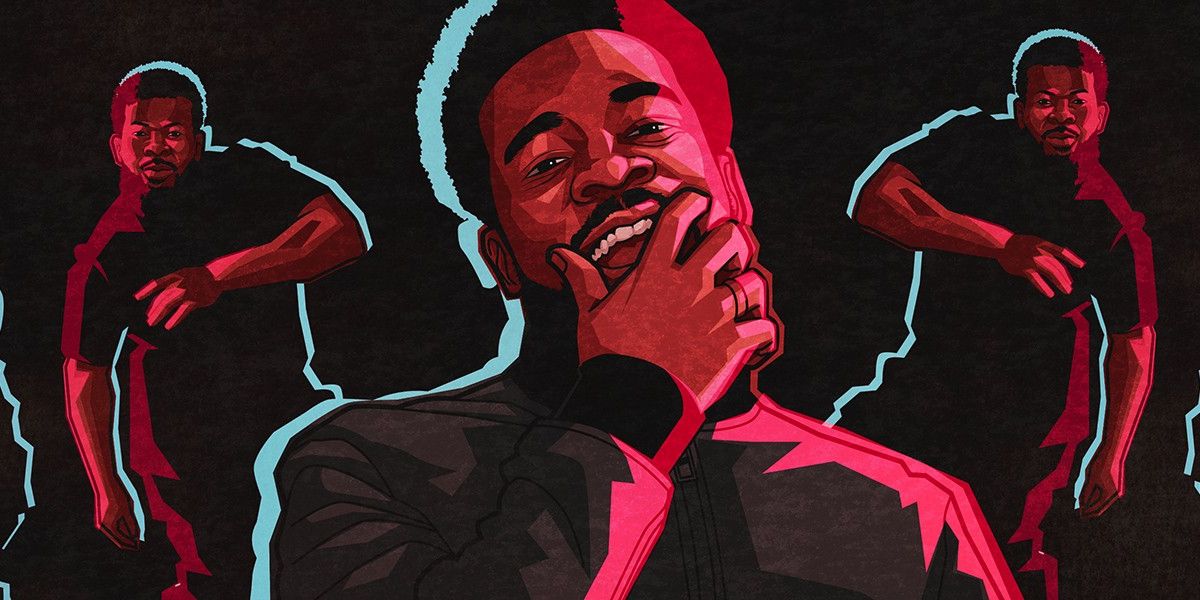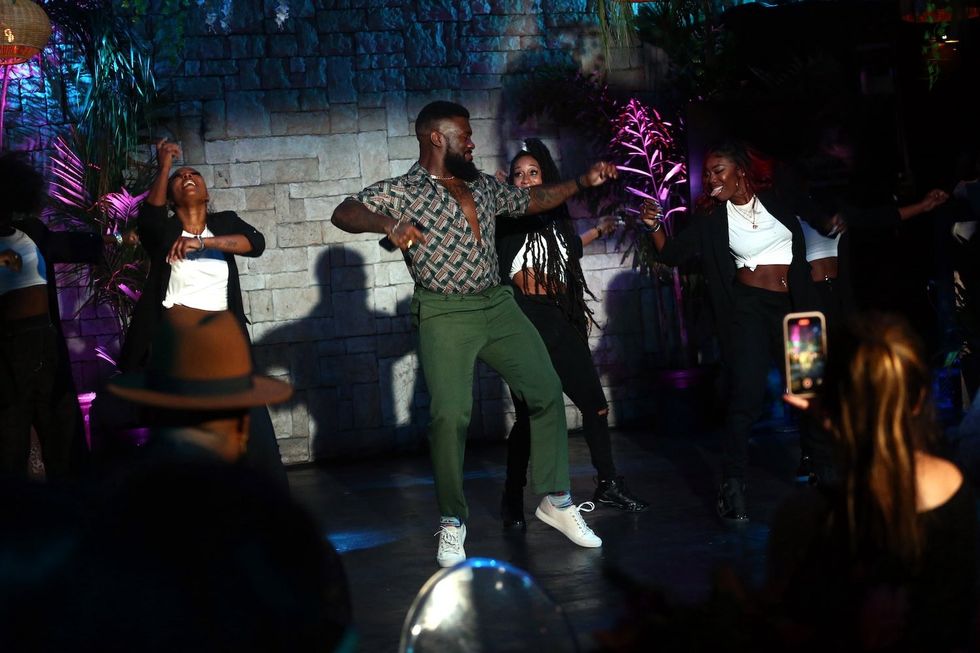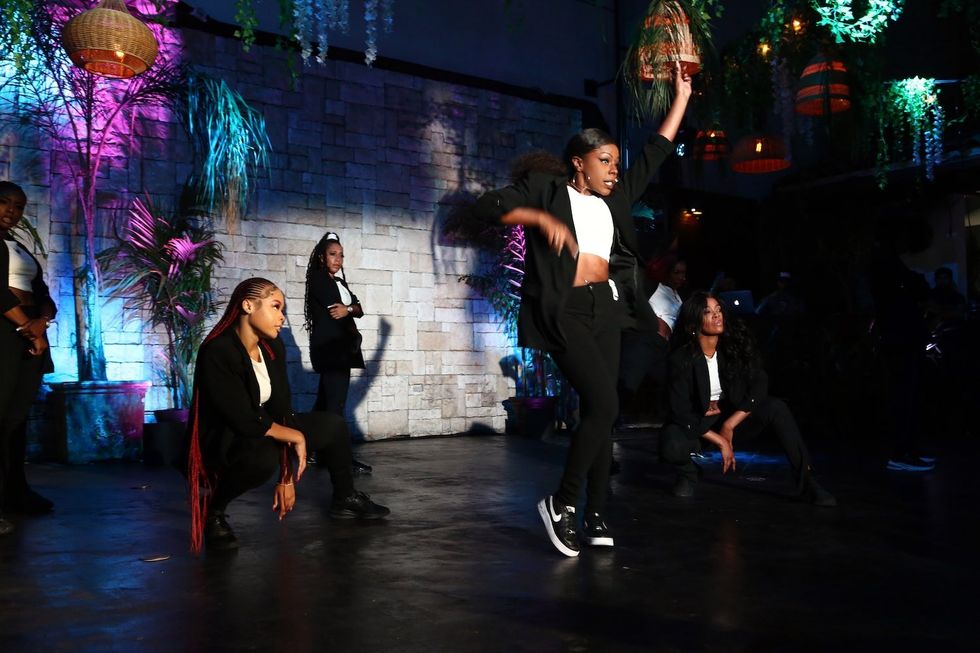
Illustration by Pope Phoenix
To continue reading
Create a free account or sign in to unlock more free articles.
By continuing, you agree to the Terms of Service and acknowledge our Privacy Policy
Register
The content is free, but you must be subscribed to Okayplayer to continue reading.
THANK YOU FOR SUBSCRIBING
Join our newsletter family to stay tapped into the latest in Hip Hop culture!
Login
To continue reading login to your account.
Forgot your password?
Please enter the email address you use for your account so we can send you a link to reset your password:

Across the coronavirus pandemic, households across the world — bored, anxious and in need of escapism — turned to virtual dance trends to temporarily quell concerns pertaining to the outside world. Whether it was Doja Cat's "Say So," Megan Thee Stallion's "Savage," or Roddy Ricch's "The Box," TikTok, Triller, Instagram, and Snapchat were harnessed to distribute, create, and arrange these contemporary approaches to dance. (TikTok in particular rose from 3% in 2019 to 19% in the first quarter of 2021 of millennial users engaging with the platform.) As the age of the internet continues to integrate dance into their ecosystems, however, the emergence of theft, accreditation and credit get taken outside of the physical and into the digital, with many architects being erased from their narratives in real time. From billion-dollar video games banking off popular rap dances to late night TV shows failing to prop up the originators of popular contemporary dances, it's challenging for choreographers and dancers — particularly Black choreographers and dancers — to maintain credit over what they've created. However, some of music’s most well-known and established dancers and choreographers are addressing this ongoing issue in more ways than one, hoping to create a path for their successors to not only be properly credited for their work, but paid for it, too.
Last year, dancer and choreographer JaQuel Knight created Knight Choreography and Music Publishing, a company that functions like that of a music publisher except it oversees the rights to Knight’s dance moves. Having conceived many of pop culture's most notable singular steps and robust routines — from Beyoncé's “Single Ladies” to Cardi B and Meg's “WAP” — the North Carolina-born dancer’s frameworks are etched into the mainstream canon of music. So, it’s understandable that Knight isn’t only the first choreographer in history to copyright his dance moves, but the first to create a legal pathway to protect his and other dancers and choreographers’ work.

“It’s time for us to start changing the narrative and protecting us as artists and allowing us to have a seat at the table,” Knight said.
Knight has a multifaceted approach when it comes to protecting choreographers and creators through his company — from helping them negotiate their terms and retaining their rights to obtaining ownership and registering their works.
“We want to be in a place where we can take that intellectual property and solicit it out to these corporations that have been known to take advantage of creators in the past,” Knight said, noting the ongoing “theft” in the gaming sphere from companies like Epic Games (the video game developer behind the billion-dollar Fortnite) as a contemporary example of artists losing their rights instantaneously.
Fortnite has often adopted — without expressed permission — “emotes” (dance moves) like the Milly Rock, Carlton, floss, and other dance moves created (or popularized) by Black people, changing the names of the dances and presenting them as something the game invented. It’s these emotes that Epic Games gets most of its revenue from, selling each one for anywhere between $5 and $10. This has led to not only widespread debates about the game’s appropriation of Black cultural productions, but the people behind certain emote-inspired dances filing lawsuits against Epic Games. Rapper BlocBoy JB publicly called out Fornite’s adoption of his “Shoot” dance prior to filing a lawsuit in 2018, stating that the game was taking money and credit for his intellectual property. "I just don't think it's fair what Epic is doing," Blocboy JB commented in a press statement at the time. "I started the dance and made it popular through my music. Epic didn't ask me if they could put it in Fortnite.”
Legally, Epic Games is complying within U.S. law. The Copyright Office has historically received many copyright filings, which has led to a precedent of short dance moves specifically being deemed as unsubstantial enough to constitute a dance move. The Waltz, Yoga positions, and the second position in Ballet are all used as examples in the Copyright Office’s framework of outlining copyrightable choreography. Because of this, the dance copyright lawsuits against Epic Games haven't succeeded.
Part of the construction of Knight’s company has been about engaging with the U.S. Copyright Office and contextualizing the landscape of dance as it has evolved. Knight denotes its archaic institutional framework in this terrain, outlining a need for adaptation as dance continues to mature in the '20s.
“[Knight Choreography and Publishing] also is a means of helping the Copyright Office create a system that allows the artist to be protected. They haven’t adapted their laws [in this area] for something like 40 years,” he said. “We’re in a space where we’re beginning to create new language and move this medium along at a fair pace.”
Beyond the gaming spheres, dances — particularly from Black creators — have been routinely taken without formal reference to originators with entertainment outlets, too. This was the case last year when TikTok creator Addison Rae appeared on Jimmy Fallon to do a demonstration of eight dance moves, most of which came from Black TikTok users. The moment faced widespread criticism, resulting in Fallon apologizing and interviewing the originators of the moves.
@theericklouis Visit TikTok to discover videos!
By June, Black creators on TikTok had gone on strike as a response to their dance moves being co-opted by white users. Led by dancer and content creator Erick Louis, the strike came about shortly after the release of Megan Thee Stallion’s “Thot Shit,” a song that a number of Black TikTok users had created their own dances to that quickly became appropriated.
“[White creators] profit off of the content that we create,” Louis said. “People go on and take our intellectual property and dance trends, amassing millions of followers off of things that Black people created...You see all these things happening all of the time.”
But erasure of their choreography isn’t the only problem Black dancers and choreographers face — so is proper pay, too, with many of them earning three times less than their white counterparts, or not being paid at all.
“I won't name names but a white choreographer was actually earning triple my salary and I know that I would’ve done a better job,” veteran industry choreographer Sean Bankhead said. Knight recalled a time when his peer, Tovaris Wilson, allegedly wasn’t paid for choreography he created for The Pussycat Dolls, including work that was used in their 2006 World Tour.
Although it’s become more commonplace (and supported) to call out unfair practices in the entertainment industry thanks to the advent of social media, there’s still apprehension in doing so out of fear of retaliation or being black-balled. Because of this, clusters of people still accept malpractice or unsustainable conventions, unfortunately continuing the cycle of creatives of all types having to agree to poor negotiations, rates, and conditions.
“You can’t go too high early on your career because [labels] will undercut you and go for the next person, because unfortunately, someone will take that opportunity,” Bankhead said.
As both choreography vets, Bankhead and Knight are using their experience to help the Black choreographer community in any way they can — from Bankhead helping dancers he works with receive fair and just rates to Knight helping Keara Wilson (the creator of the “Savage” challenge) copyright her choreography with the Copyright Office through a partnership with Logitech.

“Knowledge is what’s going to be able to protect this space, and protect us as a people,” Knight said, with Bankhead adding: “It’s been a long journey, and it’s always an uphill battle but I was fighting for the dancers because I care and understand the struggle.”
With Bankhead already in the process of copyrighting his works, and Knight able to successfully copyright "Single Ladies" last year, the road to choreographers gaining equitable collateral is becoming more of a reality, but is still some time away. In music and entertainment, precedents and contractual and business practices are needed to shape the democratization of choreographers and dancers' playing fields, especially when a minority occupies parts of this space. Dancers like Bankhead, Louis, and Knight — whether they’re mobilizing their voices online, speaking up in contractual and negotiation-based environments, or creating businesses that ensure creator provisions — illuminate a path to an alternative reality for Black choreographers and dancers.
—
Nicolas-Tyrell is a freelance music and culture journalist and podcaster from London with bylines at HYPEBEAST, NME, Paper Magazine and Clash Magazine. Follow him @iamntyrell
Banner Graphic: Pope Phoenix